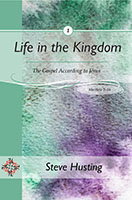What is the significance of the blood of Christ that was poured out at Calvary? When we say the blood cleanses us, what do we mean by that, especially when we cannot see any blood, and we don’t use blood for cleaning in our normal lives?
To learn more about this, it helps to research the use of the blood in the OT. Because of their persistent study of the OT scriptures, the Jewish mind was already making connections when the blood was mentioned in the NT. Our 21st century minds were not shaped by blood sacrifices. Theirs was. The NT enlarges on what the OT talked about. The NT helps us see the significance the OT hints at.
One of the earliest verses on shedding blood that has a bearing on this topic is Genesis 9:6,
“Whoever sheds man’s blood,
By man his blood shall be shed;
For in the image of God
He made man.”
Shedding or spilling blood, then, indicates that someone has been killed.
A second important passage we can use to understand the blood of Jesus is found repeatedly in Leviticus regarding the sacrificial offerings. For example, Leviticus 1:1-5 speaks of the burnt sacrifice. An animal without blemish is killed, the sinner puts his hand on the animal, and the offering “will be accepted on his behalf to make atonement for him” (v. 4).
So when an Israelite breaks God’s law, and wants the Lord to continue to bless him, he brings in the prescribed animal as a substitute sacrifice. Instead of dying for his own sin, he places his hand on the head of the animal and transfers his guilt. He sees his death passed on to the animal when it is killed, and he himself is spared. The blood is spilled on behalf of another.
A third helpful passage on the blood is Exodus 12:1-14, the first mention of the passover. In this case, a perfect lamb is killed by the Israelites at the direction of God on the tenth day of the month, and its blood applied to the doorposts. That night the angel of death and God went from house to house to take the life of each family’s firstborn as a sign to Pharaoh.
But when the two see the sign of the blood smeared on the doorposts, v. 13, God will pass over them and they will be spared. So here the blood is a sign. Applying that blood as God directed was an act of faith, that God will deliver them from the evening’s judgment (v. 12). They trusted in the blood to save them.
From these illustrations, we see that spilling someones blood is an act of killing; the spilled blood can be a sign; and it can atone for the sins of another. All three of these aspects apply to the blood of Christ in the NT.
From these basic facts, we know:
1. Jesus died on the cross. His blood was literally spilled through the piercing of the thorns on His brow, the whipping that broke the skin, the nails piercing His hands and feet, and the spear thrust into His side.
2. Jesus’ death was a substitutionary death. We are to die as a consequence of our sins, and be banished from God forever. Jesus died in our place, taking our guilt on Himself, and satisfied God’s righteous wrath.
3. The Jews trusted in the blood of the passover lamb to save them from the angel of death. When we trust in the blood of the lamb (Romans 3:25), we are trusting that His death satisfied God’s wrath (a propitiation). By extension, we are trusting in His resurrection, that He will raise us from the dead as well.
With these ideas in mind, let’s examine a few passages about the blood.
A Sufficient Blood
His blood did what all the sacrificial animals offered up in ancient times could not do. None of the animals could take away the Jews’ sins (Hebrews 10:11-12). They were reminded of their sins at the annual Day of Atonement (Hebrews 10:3-4, Leviticus 16). In contrast, Jesus’ one blood sacrifice settled the issue of sins once for all. The benefits of His work goes to those who believe in Him.
A Covenant Blood
He brings us into a new covenant of faith. Part of that covenant is that He will no longer remember our sins (Hebrews 8:10-13). Of course, God being God cannot forget what we’ve done, so this promise means that He will never hold them against us any more, ever.
Again, this is unlike the covenant of old, in which God remembered their sins every year (Leviticus 16:29-31). Covenants in the OT were initiated by blood (Hebrews 9:18-22). Jesus’ own blood ratified the new covenant. In the upper room with His disciples, Jesus held up the cup and said, “This my blood of the new covenant” (Mark 14:23-24).
A Healing Blood
Whipping Him opened up His back, and as a result of believing in Him, “By His stripes we are healed” (Isaiah 53:5). Knowing that He died in our place heals us of any ongoing guilt for what we’ve done. We have been truly freed from guilt. Any residual but ongoing guilty feelings about the past are not from the Lord, but from ourselves and the enemy that wants to turn us from enjoying the peace we have with God.
A Cleansing Blood
As a result of the blood of the covenant, we can stand on the promise of God: “If we confess our sins, He is faithful and just to forgive us our sins and to cleanse us from all unrighteousness.” (1 John 1:9). God is “faithful” to the covenant to forgive our sins when we confess them. He is “just” to do what the covenant requires, and cleanse us of all sins. Even more, if we continue to live according to the light we’ve received, then “the blood of Jesus Christ His Son cleanses us from all sin” (1 John 1:7). Through the new covenant, we have an ongoing cleansing as we live by faith in Jesus.
His blood washes away our sins (Revelation 1:5, 7:14) in a way that the ceremonial water and works of the OT priests could never do.
A Redeeming Blood
His blood redeems us, or purchases us, from evil (1 Peter 1:18-19). I see no verse in the OT of people being redeemed by blood, but God does redeem His people: “I will redeem you with an outstretched arm and with great judgments” (Exodus 6:6). Jesus’ death and resurrection would fit the parameter of God saving us by His strength alone. Jesus said He came as a “ransom for many” (Mark 10:45) to redeem us. This idea of redemption alludes to the idea of buying people off the slave block.
Also in Exodus 21:28-32, we find a man paying a ransom to be set free from capital punishment. Christ’s death redeemed us from the curse of the law (Galatians 3:13), such as the capital punishment demanded by the law, and by His own blood bought us for Himself (Acts 20:28). (A curse is a negative judgment because of sin.) We belong to Him forever. He looks forward to the day He will return and claim us as His wife (Revelation 19:7-8), and take us up as His jewels (Malachi 3:17).
An Atoning Blood
His shed blood stands for the whole redeeming process, His death, burial, and resurrection. It is a sign for the finished work of God on our behalf. Through that work we are justified by His blood and saved from God’s wrath (Romans 5:9)–we are not only declared not guilty of our sins, but declared righteous. We also have “peace through the blood” (Colossians 1:20), and “boldness to enter” into His presence (Hebrews 10:19).
Life-giving Blood
His blood also represents His life. When we eat His body and drink His blood (John 6:53-58)–when we ponder Him and His work and believe in Him–we’ll find His life in us. The Spirit of the Lord will use our dedication to imitate Christ to mold us into that same image from glory to glory (2 Corinthians 3:18). In this molding and shaping we are finding His life in us.
Through the precious blood of the Lamb:
1. We rejoice that our sins, which were many, are put out of God’s mind. We rejoice that we need not walk around with the guilt of past sins.
2. We have a basis for returning boldly to God for cleansing of any current sins.
3. We see the love of God, that He dealt decisively with the sin issue that would have forever separated us from Him.
4. We see God’s love for sinners, that the Son would leave His place of exaltation and die as a human criminal to pay the ransom that sets us free.
5. We see the magnificence of God’s plan played out over the centuries to secure our salvation through Christ’s one sacrifice. All the OT types and shadows, and pointedly prophetic passages, reveal God’s zeal in pursuing His plan to set us free.
6. We see God’s NT provision in Christ as greater than anything the OT could produce to save us. Yet the OT not only points us to faith in Christ, but reveals what doesn’t work, providing a cautionary tale through Israel as a nation.
May this Easter season be a time of spiritual correction to embrace the new covenant of peace through His blood. What other reasons make the blood of Jesus precious to you?






